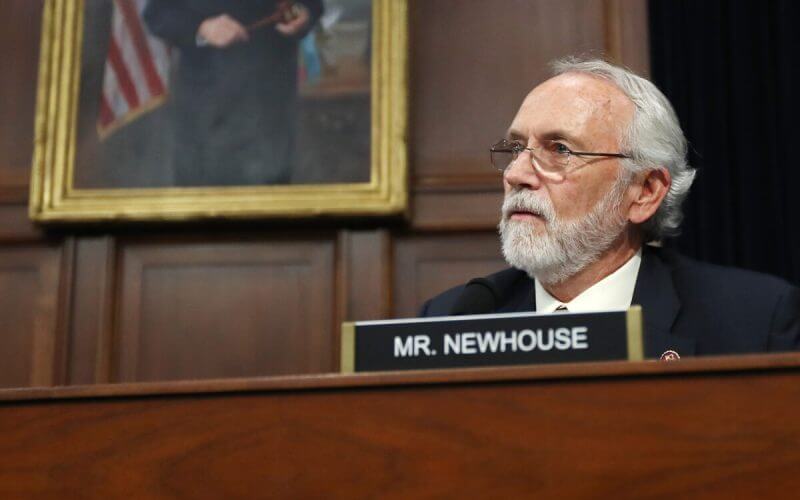China’s involvement in the U.S. agricultural sector is under greater scrutiny, with politicians sounding the alarm about economic and national security risks stemming from Chinese purchases of prized American farmland.
Late last month, Rep. Dan Newhouse (R-Wash.) introduced legislation that would ban the purchase of agricultural land, including ranches, in the United States by foreign nationals affiliated with the Chinese regime.
“If we begin to cede the responsibility for our food supply chain to an adversarial foreign nation, we could be forced into exporting food that is grown within our own borders and meant for our own use,” Newhouse noted in a press release.
The proposed bill, which would also bar Chinese government-linked entities from participating in virtually all U.S. Department of Agriculture (USDA) programs, continues Newhouse’s campaign to prevent the Chinese Communist Party (CCP) from gaining a foothold in America’s food supply chain.
In June of last year, the congressman introduced a bill that would block the purchase of U.S. agricultural land by Chinese-owned companies. Newhouse’s proposal, an amendment to the fiscal 2022 funding bill for the U.S. Department of Agriculture, was ultimately dropped in the conference committee, according to an account by Agri-Pulse.
Six states already have laws banning foreign ownership of agricultural land, including Hawaii, Iowa, Minnesota, Mississippi, North Dakota, and Oklahoma. But as Newhouse points out, Chinese investors can bypass these restrictions by purchasing American corporations that own farmland.
Other efforts to restrict Chinese investment in American farmland include a bill advanced by Rep. Chip Roy (R-Texas) aimed at banning any CCP members from buying public or private land in the United States. In a statement, Roy claimed that China has been snapping up land and strategic infrastructure around the world in a “quest for global domination.”
Introduced in June 2021, the bill has little chance of getting passed by a Democrat-controlled Congress, according to conservative writer Daniel Horowitz. Meanwhile, in Arizona, Republican state lawmaker Wendy Rogers introduced a bill this past February to outlaw real property ownership by CCP members in the Grand Canyon State.
A recent report published by the U.S.-China Economic and Security Review Commission (USCC), a federal agency, sheds light on the problems that unfettered Chinese involvement in U.S. agriculture could pose. They run the gamut from intellectual property theft and environmental damage to potential military threats.
For example, Chinese meat processor Shuanghui International Holdings purchased the largest U.S. pork producer, Smithfield Foods, in 2013. Through this landmark deal, Shuanghui (now WH Group) gained 146,000 acres of U.S. land scattered across more than six states, hosting Smithfield assets from hog farms to processing plants.
The acquisition was a clear win for Beijing, allowing China to benefit from Smithfield’s reputation and food safety record, giving it access to the company’s valuable technology, and helping China diversify its agricultural supply chain and boost the yields of its herds. Smithfield supplied vast amounts of pork to Chinese consumers as African swine fever ravaged China’s domestic hog farms and the COVID-19 lockdowns disrupted production.
For the United States, the benefits of China’s investment are less straightforward. Raising hogs takes a toll on the environment and surrounding communities, which is presumably one reason China would prefer to keep its hog farms overseas.
Smithfield is the third-largest water polluter among U.S. meatpackers, according to a Federal Trade Commission filing by Food & Water Watch. In 2019, the company and its contract factory farms received at least 66 notices of violations of environmental protection laws, an increase from previous years.
Ownership of Smithfield also gives a Chinese company, and by extension the CCP, more influence over U.S. supply chains. After its purchase of Smithfield, WH Group bought up a number of processing facilities, farms, grain elevators, and other U.S. assets that allowed the company to cut out many American suppliers and service providers.
“As seen with the Smithfield case, large agribusinesses have the resources to streamline their production lines by purchasing links or companies along the chain,” the USCC report notes. “This may create economic distortions in the U.S. agriculture market should China have more leverage over U.S. suppliers, resulting in more closed market or intracompany trade transactions.”
The report also highlights a more basic problem with Chinese land acquisitions—their lack of transparency. Nobody really knows how much U.S. land is owned by CCP-linked entities. Officially, Chinese investors own 352,140 acres of land in the United States, or just under 1 percent of all foreign-held acreage, according to a report by the USDA’s Farm Service Agency. Foreign investors held 2.7 percent of privately-owned agricultural land in the United States as of 2019, according to the USDA.
But as the commission report points out, information about ownership and use of U.S. land is murky and incomplete. Federal reporting requirements aren’t very stringent, Chinese companies can circumvent them without much difficulty, and the government lacks enforcement mechanisms in cases of no reporting or false reporting.
A puzzling twist is the huge amount of Chinese-owned land that is classified as “other land,” as opposed to cropland or pasture land. Other land has unclassified uses, such as swamps, marshes, and bare rock. In 2013, the year of the Smithfield acquisition, 78 percent of the 192,928 acres of U.S. land owned by Chinese investors was other land.
The national security implications of the CCP controlling large swaths of American land have also drawn increasing concern. Last November, China’s Fufeng Group purchased 370 acres of land in Grand Forks, North Dakota, as the location for a massive new corn-milling plant. The facility will sit roughly 12 miles from the Grand Forks Air Force Base, prompting speculation that it could be used for active and passive monitoring of the sensitive military site.
The project has attracted controversy in Grand Forks and is currently undergoing third-party legal review to determine if it qualifies for review by the Committee on Foreign Investment in the United States, a federal panel that scrutinizes foreign deals for national security risks.
“The critical missions our military executes at Grand Forks Air Force Base must be protected,” Sen. Kevin Cramer (R-N.D.) said in a statement to the Grand Forks Herald earlier this year. He added that the jobs and economic benefits from the plant must be weighed against “the long-term concerns of China infiltrating our food supply chains.”









